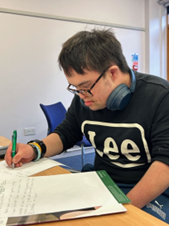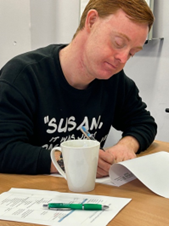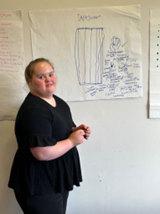Current Research
The four decades of DSRP have produced a wealth of research material which can be viewed here.
Current projects are listed below.
The Longitudinal Study
Research Team
Professor Monica Cuskelly, Dr Anne Jobling, Dr MariaRosa Mallardo, & Dr Jan Lloyd
The longitudinal study has changed its focus as the individuals with Down syndrome age in an effort to contribute to the challenges facing individuals and their families at different times in the life span. The members of the longitudinal cohort are now approximately 35-45 years of age. One of the issues at this life stage is mental well-being. Our current efforts are focussed on this area of health, with the intention of contributing to knowledge about how to support good mental health in this population.
For more information contact Professor Monica Cuskelly
Inclusive Secondary Mathematics
Research Team
Dr Rhonda Faragher, Professor Karen Nankervis, Professor Kim Beswick & Professor Monica Cuskelly
LYLAC Project – Learning Year Level Appropriate Curriculum: Secondary Mathematics for Students with Down Syndrome
Faculty of Humanities and Social Sciences Partnership Research Grant 2018-2019
In collaboration with Edmund Rice Education Australia, Down Syndrome Australia and the Down Syndrome Association of Queensland, a project commenced in 2018 that investigates the practices of teachers as they teach secondary mathematics to their classes that include a student with Down syndrome. The project aims to find ways to adjust regular secondary mathematics to make it accessible for learners with Down syndrome.
For more information contact Dr Rhonda Faragher
Literacy Project
Research Team
Associate Professor Karen Moni, Dr Anne Jobling & Ms Jan Lloyd
Latch-On, a literacy program for individuals with intellectual disabilities, was initiated and designed by Karen B. Moni, PhD and Anne Jobling, PhD at the School of Education, in The University of Queensland with the assistance of Mrs Jan Lloyd and Dr Michelle Morgan.
The program began in 1998 and has a strong foundation in educational research and practice. The researchers were able to draw on and extend the knowledge and understanding they had gained over many years in the fields of intellectual disability, English curriculum and literacy learning in the development of this innovative program.
From the beginning research has been an integral component of the program. Initially, the longitudinal study of children with Down syndrome provided evidence that there were gains in development over time (Jobling & Cuskelly, 1998) and that with opportunities young adults with intellectual disabilities could broaden their literacy education through appropriate teaching and learning strategies, and continue to develop and improve their language and literacy skills.
Within the six years of the development of Latch-On our research component has two key foci. First, the program’s content and strategies were trialed and evaluated longitudinally (over six years). In addition, more targeted research opportunities in areas such as technology use, developing comprehension, and developing oral literacy have also been undertaken by several master’s students. The program was framed by philosophical underpinnings connecting it to communities of practice, where Latch-On students and teachers work together to develop new understandings of and about language, literacy and texts. In developing this community the literacy is linked to other social endeavours that assist the students to develop as lifelong learners (Moni & Jobling 2000).
The focus on multiliteracies recognises that the learner needs to engage with texts in print, oral and multi-media domains, in a wide range of contexts, for different purposes in order to understand the world in which they live. So the Latch-On program is comprised of all the interwoven elements: speaking and listening, viewing, reading, writing, and the use of technology.
Second, using data that has been collected during the first six years of the program, the achievements of the students involved in the program has been documented (Moni & Jobling 2001). These data validated the program’s philosophies as well as the program’s focus and strategies.
For more information contact Associate Professor Karen Moni
Ageing and Down syndrome
People with Down syndrome sometimes worry about getting old – getting dementia, losing independence and moving into a care home. There is a perception in the Down syndrome community that ageing is likely to bring with it dementia and this time of life can be approached with fear and dread.
Does that need to be the case? Are there approaches that could benefit people with Down syndrome allowing them to enjoy a good quality of life as they age?
With support of a British Academy Visiting Fellowship, Professor Rhonda Faragher AO and Professor Karen Watchman (based at the University of Stirling) are co-designing a research proposal with three experts with Down syndrome: Justin Chan, Neil Price and Jenna Wardrop.
Their work over 2 days on the project has involved getting to know each other, developing a working agreement and then discussions about ageing. Karen trialled a game designed to support people in developing friendships after a change in accommodation.
An important role of the experts was to contribute to the design of Easy Read materials for the project. They also trialled questions from a published quality of life scale. The team wrote what they wanted others to know about them when they got older. This was in preparation for designing a proposal to study ageing well with Down syndrome.
The experts wrote about their project work.

Justin Chan
I am thinking about find jobs.
Then games. Going to late.
End [of day 1].
It was awesome and big fan and legend. Justin Chan thanks you.
Day 2
Morning breakfast and hot tea then shower. Then brush my teeth then get dressed then play my music phone.
Then arrived to university.
After that, have a break then more work. Then lunch time. Then Question game then blog after that.
Hot tea again then Easy Read then home time.

Neil Price
Learning and finding out new things to try and be helpful while having a nice day.
Being in a hotel function room is where I am happy to be in, as it brings back memories of working in a Glasgow hotel.
I enjoyed learning about myself and trialling the game. Then meeting new people as well.
That I am willing to share my thoughts and opinions, to be able to be myself with everyone that I’m with and working with on this blog.
To listen and then to respond to know what makes me stand out in a crowd, to feel valued and liked.

Jenna Wardrop
We had a chat around the circle.
Then we did our Working Agreement.
Had our lunch.
Then Karen make us a homemade game.
I had fun today.
We did our lives [life timeline]. I loved to go back.
I like doing the blog and I like the Easy Read.
Then we did a question game, then another easy read.
I like my colleagues. Really lovely.
I loved my days at the university. I like to go back again at some time.
If you would like to support this research, you can donate here.
